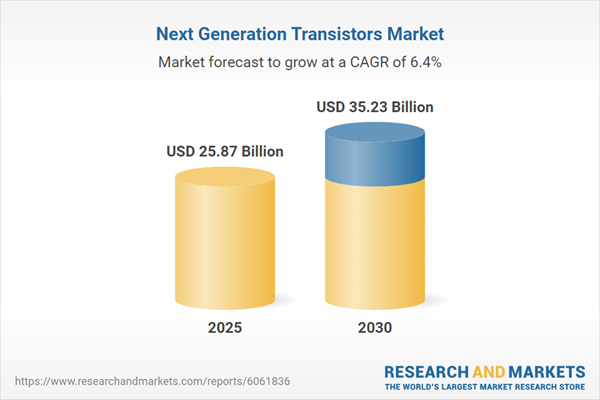There has been a substantial increase in investment in developing high-powered and more efficient transistors. They find their applications across multiple devices, including but not limited to smartphones, tablets, and notebooks. However, despite the reportedly shrinking scale compared to Moore’s Law, chip manufacturers have increased their investments in research and development to create transistors with narrower fin widths.
Market Trends:
- Expansion of the consumer electronics sector: The rising global demand for consumer electronics is a key driver of the next-generation transistor market. These transistors play a critical role in enhancing device performance and improving battery efficiency. Over recent years, the consumer electronics market has experienced significant growth, fueled by advancements in electronics technology and increasing disposable incomes worldwide.
- Competitive strategies shaping next-generation transistors: The evolution of next-generation transistors is being driven by competitive strategies, including heightened research and development activities and the steady introduction of innovative and advanced transistor technologies.
- Efforts to overcome current limitations: Leading players in the semiconductor industry are actively working to address the limitations of current-generation transistors. This initiative aims to tackle the growing issue of energy waste in modern computing while simultaneously boosting processing capabilities and broadening the applications of integrated circuits (ICs). Gallium nitride (GaN) transistors, for instance, offer faster and more efficient performance compared to silicon-based devices. They also enable the design of more compact devices with improved form factors and greater energy efficiency at higher power levels, significantly reducing power losses.
Key Benefits of this Report:
- Insightful Analysis: Gain detailed market insights covering major as well as emerging geographical regions, focusing on customer segments, government policies and socio-economic factors, consumer preferences, industry verticals, and other sub-segments.
- Competitive Landscape: Understand the strategic maneuvers employed by key players globally to understand possible market penetration with the correct strategy.
- Market Drivers & Future Trends: Explore the dynamic factors and pivotal market trends and how they will shape future market developments.
- Actionable Recommendations: Utilize the insights to exercise strategic decisions to uncover new business streams and revenues in a dynamic environment.
- Caters to a Wide Audience: Beneficial and cost-effective for startups, research institutions, consultants, SMEs, and large enterprises.
What can businesses use this report for?
Industry and Market Insights, Opportunity Assessment, Product Demand Forecasting, Market Entry Strategy, Geographical Expansion, Capital Investment Decisions, Regulatory Framework & Implications, New Product Development, Competitive Intelligence.Report Coverage:
- Historical data from 2022 to 2024 & forecast data from 2025 to 2030
- Growth Opportunities, Challenges, Supply Chain Outlook, Regulatory Framework, and Trend Analysis
- Competitive Positioning, Strategies, and Market Share Analysis
- Revenue Growth and Forecast Assessment of segments and regions including countries
- Company Profiling (Strategies, Products, Financial Information, and Key Developments among others)
The Next Generation Transistors Market is analyzed into the following segments:
By Type
- Bipolar Junction Transistor (BJT)
- Metal-Oxide-Semiconductor Field Effect Transistor (MOSFET)
- High Electron Mobility Transistor (HEMT)
- Others
By Type of Material
- Indium Arsenide (InAs)
- Gallium Arsenide (GaAs)
- Indium Phosphide (InP)
- Gallium Nitride (GaN)
By End-user Industry
- Aerospace and Defense
- Consumer Electronics
- Communication and Technology
- Industrial
By Geography
- North America
- USA
- Canada
- Mexico
- Others
- South America
- Brazil
- Argentina
- Others
- Europe
- Germany
- France
- United Kingdom
- Spain
- Others
- Middle East and Africa
- Saudi Arabia
- UAE
- South Africa
- Israel
- Others
- Asia Pacific
- China
- Japan
- South Korea
- India
- Thailand
- Indonesia
- Taiwan
- Others
Table of Contents
Companies Mentioned
- Intel Corporation
- Qualcomm Technologies, Inc.
- NXP Semiconductors N.V.
- SK Hynix Inc.
- Texas Instruments
- Toshiba Corporation
- MediaTek, Inc.
- Fujitsu
- Wolfspeed, Inc.
- Renesas Electronics Corporation
- Infineon Technologies AG
- ON Semiconductor Corp.
- STMicroelectronics N.V.
Table Information
| Report Attribute | Details |
|---|---|
| No. of Pages | 135 |
| Published | March 2025 |
| Forecast Period | 2025 - 2030 |
| Estimated Market Value ( USD | $ 25.87 Billion |
| Forecasted Market Value ( USD | $ 35.23 Billion |
| Compound Annual Growth Rate | 6.3% |
| Regions Covered | Global |
| No. of Companies Mentioned | 13 |









